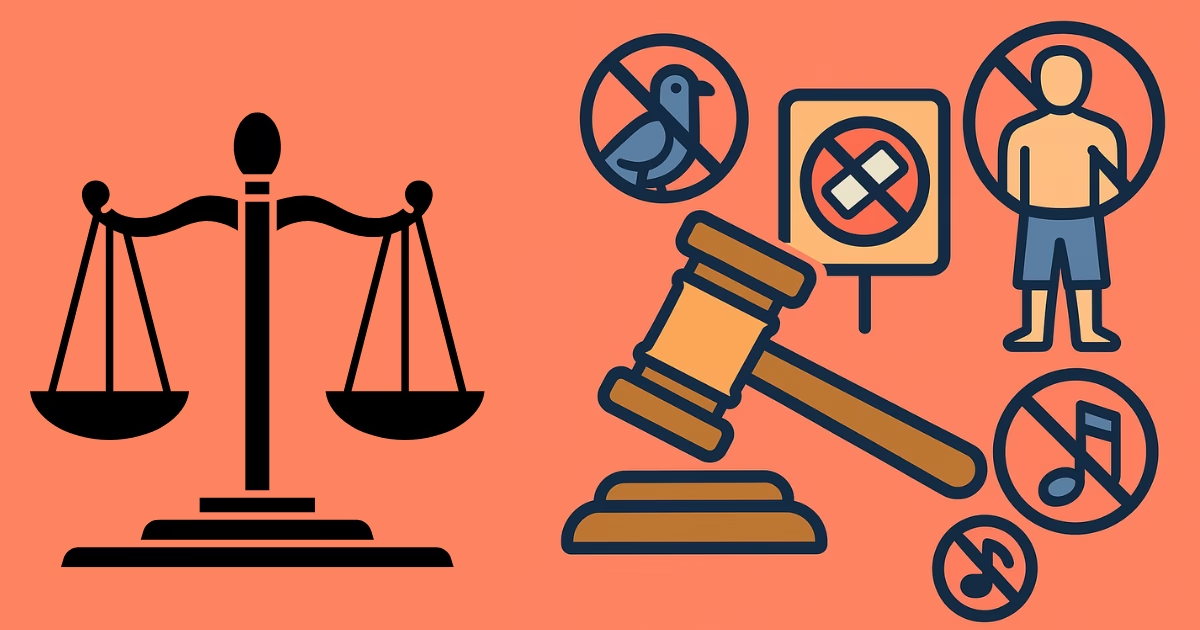Singapore is known for its cleanliness, order, and strict rules—but some of those rules can be downright odd. In fact, there’s a whole list of dumb laws in Singapore that sound more like jokes than real legislation. From banning chewing gum to regulating what you wear at home, the city-state has some surprising restrictions that often leave tourists scratching their heads. But are these laws actually enforced? And why do they exist in the first place? This blog takes a closer look at the weirdest and most unexpected rules in Singapore. Whether you’re planning a trip or just curious about global oddities, you’ll find these laws both strange and fascinating. Some are outdated, while others are still very real—so knowing them might save you from a fine or two.
Dumb Laws in Singapore That Will Blow Your Mind
Singapore might look modern and high-tech on the surface, but when it comes to its legal system, some rules feel like they came from another planet. Many of these laws are rooted in the country’s strict focus on public order and cleanliness, but that doesn’t make them any less odd. Imagine getting fined for not flushing a toilet, or for walking around your own home in the nude. Sounds crazy, right? Yet these things are actually illegal—or at least, they used to be.
In this section, we’ll explore the strangest, most confusing, and downright dumb laws in Singapore that still exist today. Some are enforced strictly, others just sit in the books gathering dust. But one thing’s for sure—they’ll leave you surprised, confused, and maybe even laughing.
Chewing Gum Ban: Still a Sticky Situation
Probably the most famous of Singapore’s laws is the chewing gum ban. It’s not just discouraged—it’s literally illegal to import or sell chewing gum in the country. This law was introduced back in 1992 to keep public places clean. Officials were tired of scraping gum off sidewalks, train doors, and public benches.
The ban isn’t just strict—it’s serious. Anyone caught selling gum could face heavy fines or even jail. While therapeutic gum (like nicotine gum) is allowed with a prescription, regular chewing gum is still off-limits.
Tourists often find this one hard to believe. After all, in most countries, chewing gum is harmless. But in Singapore, it’s viewed as a public nuisance. Whether you agree or not, it’s part of what makes Singapore so spotless—and also a bit quirky.
Singing Obscene Songs in Public? Illegal.
Believe it or not, singing rude or obscene songs in public is actually a punishable offense in Singapore. The law targets those who might disturb public peace with offensive lyrics, especially in crowded areas.
But here’s where it gets strange—what counts as “obscene” isn’t always clearly defined. Is a slightly suggestive pop song a problem? What if it’s just loud karaoke in a park?
It’s unlikely that someone will be arrested for humming a pop song. Still, this law shows just how serious Singapore is about keeping public spaces respectful. You might want to keep your concert voice at home.
Not Flushing a Public Toilet? That’s a Fine
Yes, you read that right. In Singapore, failing to flush a public toilet can get you fined. This law is aimed at keeping hygiene standards high, especially in public facilities.
Signs in many public bathrooms remind users to flush or face a fine of up to $150. There are even restroom attendants in some places to keep an eye out.
It might sound over-the-top, but it works. Singapore’s public toilets are among the cleanest in Asia. Still, it’s one of those dumb laws in Singapore that surprises almost everyone who visits.
Naked in Your Own Home? Think Again
In Singapore, if you’re walking around your home naked and someone can see you from outside, you could actually be fined or charged under laws against public indecency.
The key detail here is visibility. If your windows are open and someone catches a glimpse, it could be seen as an offense—even though you’re inside your own space.
It’s rare for someone to be arrested for this, but the law does exist. So maybe pull the curtains before you relax in the nude.
Feeding Pigeons Is a Crime
Feeding pigeons might feel like a harmless act, but not in Singapore. Under local laws, feeding birds—especially pigeons—is banned.
Why? The reason is hygiene. Pigeons can carry diseases, and leftover food creates messes. To control the population and keep areas clean, this law was enforced.
Anyone caught feeding pigeons could face a fine of up to $500. That’s an expensive snack for a bird.
Elevator Urine Detectors Exist (And They’re Real)
This sounds like science fiction, but it’s very real. Some public elevators in Singapore are fitted with urine detectors. If someone decides to relieve themselves in the lift, the doors lock and police are notified.
This was introduced after repeated issues with vandalism and hygiene in public housing blocks. It’s extreme, but effective.
It’s another example of how far Singapore will go to keep things clean—even if the method feels a little sci-fi.
Don’t Steal Wi-Fi—It’s Hacking Here
In many places, using someone else’s open Wi-Fi might be rude, but not illegal. In Singapore, though, it’s considered a form of hacking.
Accessing a network without permission—even if it doesn’t have a password—is a crime under the Computer Misuse Act. Penalties include heavy fines or even jail time.
Many tourists and newcomers don’t know this law and think open networks are free for all. But in Singapore, think twice before tapping into your neighbor’s signal.
Owning a TV May Require a License
Here’s one of those weird holdovers from the past. While not strictly enforced for individuals, there’s technically a rule stating that if you own a television set, you may need a license—especially if you use it in public or for business.
This law mainly affects shops and restaurants that broadcast shows. But it’s still on the books and occasionally mentioned in discussions about Singapore’s strict media controls.
It’s not a law that most residents worry about, but it’s strange enough to make the list.
Playing Loud Music or Instruments = Public Nuisance
Singapore wants its public spaces to be peaceful. So if you’re planning on jamming out with your guitar at 2 AM, think again.
Playing loud music or instruments in public areas can be considered a public nuisance. Offenders might be fined or told to stop, especially in residential zones.
Even loud Bluetooth speakers on the MRT have been known to cause trouble. It’s not that music is banned—it just needs to be played at a respectful volume.
Spitting in Public? Say Goodbye to $1000
Another law that shocks tourists: spitting in public can land you a fine of up to $1000. It’s part of Singapore’s effort to keep streets and public places clean.
The law isn’t just about appearance. Spitting can spread germs and diseases, which is why authorities take it seriously.
While this rule might seem extreme, it has helped build Singapore’s clean image. Still, to outsiders, it often feels like overkill.
Why Are These Dumb Laws in Singapore Still Around?
Many of these laws were introduced decades ago to build a clean, safe, and well-organized country. Singapore had to develop fast, and these strict rules helped shape its success.
Today, some of these laws feel outdated or even silly. But for many locals, they’re just part of daily life. Some laws are rarely enforced, but they remain as reminders of the city-state’s unique approach to discipline and order.
Cultural values play a role too. In a place where social harmony is valued above individual freedom, laws that seem “dumb” to outsiders might actually make sense to locals.
Are These Laws Actually Enforced Today?
Not all of them. While a few, like spitting or not flushing, are actively enforced, others are mostly symbolic now. You probably won’t get arrested for walking around your home unclothed—unless someone complains.
Still, Singapore doesn’t mess around with rules. Tourists and locals alike are expected to follow them. And ignorance is no excuse under the law.
The best advice? Know the laws before you go. Even the strange ones.
Also Read: New Hampshire Dumb Laws That’ll Leave You Speechless
Final Thoughts on Dumb Laws in Singapore
The dumb laws in Singapore may seem strange, funny, or even ridiculous. But they also tell a story—of how one small country built a reputation for safety, cleanliness, and discipline.
Some laws make sense when you know the culture. Others are just plain weird. But all of them reflect Singapore’s unique identity.
So whether you’re planning a visit or just enjoy reading about legal oddities, remember: always check the rules. Especially in a place as law-loving as Singapore.
FAQs About Dumb Laws in Singapore
1. Are dumb laws in Singapore still enforced today?
Some are, especially those related to cleanliness and public behavior. Others are outdated but still exist in the legal books.
2. Can you really get fined for chewing gum in Singapore?
Yes, selling or importing chewing gum is illegal unless it’s for medical purposes. Chewing it in public can lead to fines.
3. Is it illegal to be naked in your own home in Singapore?
If someone outside can see you, it may be considered public indecency, even inside your own house.
4. Why are there so many strict laws in Singapore?
Singapore uses strict laws to maintain public order, cleanliness, and safety. It’s part of their success model.
5. What happens if you don’t flush a public toilet in Singapore?
You could be fined up to $150 for not flushing after use. It’s part of their hygiene enforcement.

Hi, I’m Shafy Ali – a curious mind and passionate writer at Celiac Magazine. I cover a little bit of everything, from everyday tips and how-tos to deeper dives into topics that spark conversation. I enjoy turning research into readable, relatable content that informs and inspires. Whatever the subject, I aim to keep it clear, engaging, and genuinely useful.

